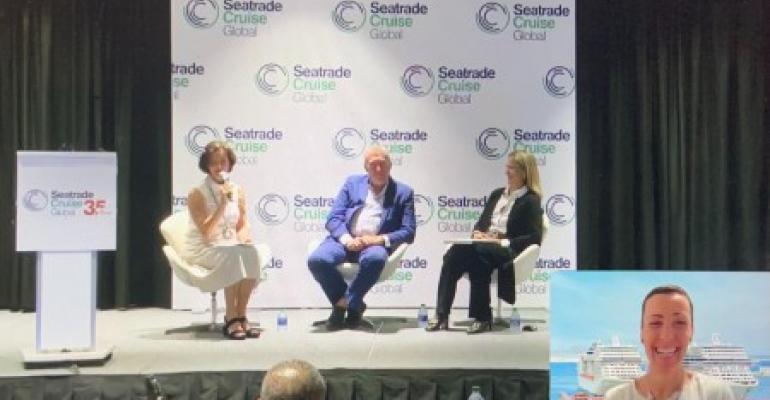'There are plenty of places to go. The problem is: Can those places receive cruise ships sustainably?'
Holmes spoke during a Seatrade Cruise Global panel dedicated to sustainabilty, a topic that came up in many sessions at last week's event. This one — moderated by Joyce Landry, CEO, Landry & Kling Global Cruise Services and founder, SustainableShips.com — delved into port congestion and touched on purchasing, waste management, ship operations and decarbonizaton.
Holmes, global sector head - cruise industry, ISS, cited 434 cruise ships operating globally, with approximately 20 more being added each year. ISS's World of Ports website tallies 4,500 ports. If harbors and other types of destinations were added, that could climb into the tens of thousands.
'The right ships in the right port'
'We just have to make sure we have the right ships in the right port and it's all managed in a sustainable way,' Holmes said.
Indonesia, for example has 2,000 ports and just 400,000 passengers a year — about half the number of one busy Mediterranean port. The Indian Ocean's Vanilla Islands (Mauritius, Madagascar, Reunion, Seychelles, Comoros, Mayotte) offer 12 cruise ports and have a sustainable development policy. The Seychelles currently block ships with more than 300 passengers and are building a new port to disperse arrivals.
Holmes said destinations should determine their carrying capacity and cap passengers and calls as part of a sustainable development plan.
Reduced mileage, lower emissions
Shorter distance itineraries can reduce exhaust emissions, and Holmes said an area like the South Aegean, with 75 islands, offers opportunities to cut mileage. He recently visited 30 of those ports in 30 days. Some aim to build cruise business in a sustainable way and are using electric vehicles for tours.
ISS wants to help develop a homeport there and is drafting itineraries for different types of islands and ships. Some would cater just to small ships, one per day, while others would be marquee destinations able to handle larger vessels.
In Dubai, a private island destination is planned for The World, one of the emirate's artificial archipelagos, to add variety within a short distance of Port Rashid.
Sustainable shore excursions
Holmes also said he's adding a sustainability aspect to a tour guide training course he developed in 2006 so that guides can become ambassadors for the sustainability of their destinations.
Several years ago, Royal Caribbean Group set a target of 1,000 Global Sustainable Tourism Council (GSTC) certified tours, a goal surpassed nearly a year ahead of schedule, and today the company offers more 2,000 sustainable tours from over 33 tour operators in more than 29 countries, according to Silvia Garrigo, chief environmental, social and governance officer.
'We can grow in a sustainable manner and a respectful manner and work with the ecosystem of actors — governments, destination managers, hotels, the cruise industry ... We're all in this together,' Garrigo said.
Linden Coppell, director of sustainability, MSC Cruises, said her company incorporates education into shore excursions, and a range of MSC tours have a strong environmental component. Tour operators are encouraged to get GSTC-certified.
Purchasing
Turning to purchasing, 'Overfishing is a huge, huge problem,' Garrigo said. For a company like Royal Caribbean, which places 'massive orders' for seafood, 'We want to make sure those orders are directed to responsible suppliers so we're working with suppliers and going to the source of fisheries.'
As outlined in its recently published sustainability report, Royal Caribbean's goal is to source 90% of wild caught fish and 75% of farmed fish from certified sustainable sources — and then to do better from there, Garrigo said.
At MSC Cruises, 450,000 tons of cod and hake purchased in 2019 were from Marine Stewardship Council-certified vendors.
'Local is first choice' when it comes to sourcing, Coppell said. This particularly applies to produce but there's also an effort to increase local purchasing of nonperishables to minimize emissions from transport.
Net zero carbon emissions by 2050
Partnerships and collaboration are critical to achieve MSC's goal of net zero carbon emissions by 2050, Coppell said.
Instead of waiting for solutions and technology advances, her company is helping drive them.
'We've got to have a front seat in this discussion. We've got to be involved in R&D projects,' Coppell stressed. 'We're an important player here, and I can see we're much more positive now about seeing a zero emissions future.'
Copyright © 2024. All rights reserved. Seatrade, a trading name of Informa Markets (UK) Limited.
Add Seatrade Cruise News to your Google News feed.  |

